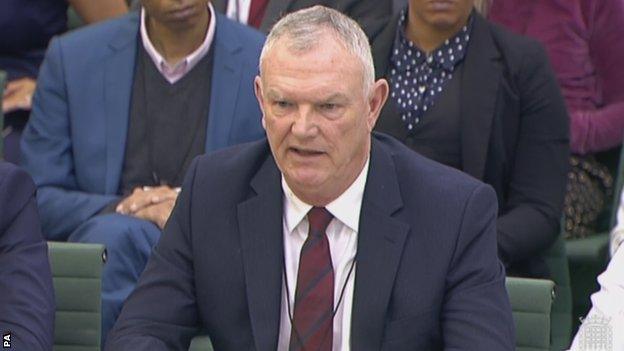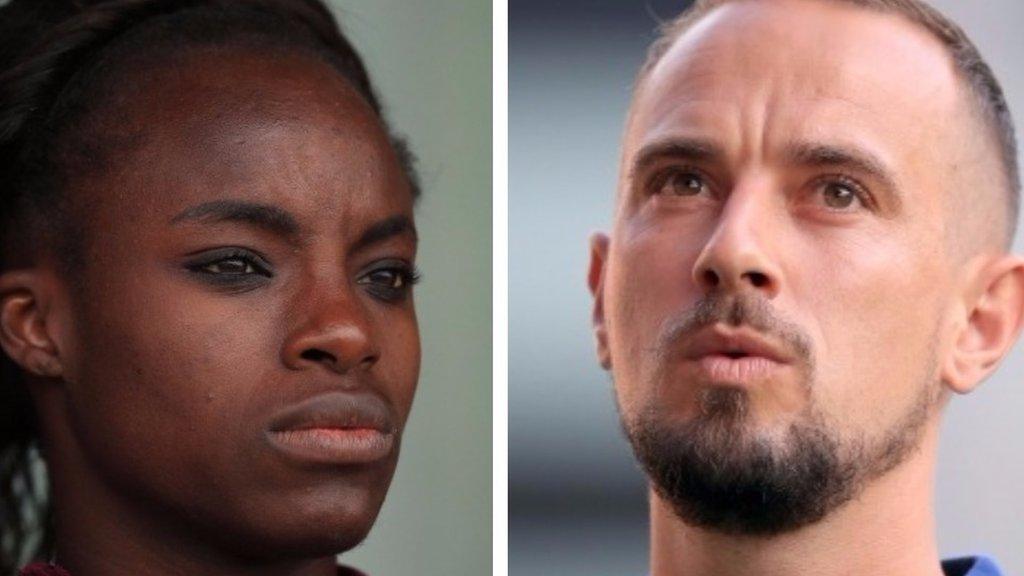Football Association has lost trust of public - chairman Greg Clarke
- Published
I didn't expect it to be Eni Aluko versus the FA
The Football Association has "lost the trust of the public" over its handling of discrimination claims against ex-England women's manager Mark Sampson, says chairman Greg Clarke.
An independent barrister ruled Sampson made unacceptable comments to players Eniola Aluko and Drew Spence.
The FA was described as "shambolic" at a parliamentary inquiry this month.
Clarke said: "We failed. What the last few weeks have exposed is how out of step we are."
He also acknowledged that he was "rightly castigated" for using the term "fluff" to describe the claims of institutional racism during last week's Department for Digital, Culture, Media & Sport parliamentary select committee hearing.
"It was a terrible word to use and I deeply regret it," said Clarke, who also said the FA will conduct a "full cultural review, top to bottom".
In a speech to the FA council, he added: "Even when our endeavours and attitudes are well meant we fall short.
"Let me be clear why this is a problem. We have lost the trust of the public, the trust of the football participating community and the trust of those domestic and international partners we need to do our job.
"This is not my assertion - the evidence is there. Our own insight tracking shows that only 27% of football fans think we are competent and even less, 24%, have a positive perception of the FA.
"We do need that trust - it is the bedrock of everything we should be about."

Greg Clarke became FA chairman in August 2016
Where did it go wrong for FA?
Aluko, who has won 102 caps for England, claimed Sampson told her to make sure her Nigerian relatives did not bring the Ebola virus to the friendly against Germany at Wembley in 2014.
She told the select committee that the FA was "dismissive" when she first made the claim.
The Chelsea striker, 30, said she felt "vindicated and relieved" by the barrister's ruling but accused English football's governing body of behaviour "bordering on blackmail" and an agenda to protect Sampson and its own reputation.
Sampson denied that claim, along with another allegation that he asked a mixed-race player - Chelsea midfielder Drew Spence - if she had been arrested before, and then jokingly suggested she had been arrested four times.
After the parliamentary hearing, the FA apologised to Aluko and Spence and said it was "not acceptable" that they had been subjected to discriminatory remarks from an FA employee.
Sampson was sacked in September following evidence of "inappropriate and unacceptable" behaviour with female players in a previous role.
'A full cultural review'
Clarke said his appearance was "a bruising personal experience and the culmination of a very damaging episode for the organisation".
He also said: "We will conduct a full cultural review, top to bottom, with a focus on improving inclusivity and our collective care for players. Performance and a positive culture must not be an either/or choice."
Clarke said the FA faces "two simple challenges":
How can we make the organisation simpler and clearer in what it does?
How can the FA better reflect the society it serves by embracing not only inclusion but the involvement of senior players and managers?
"This is not going to be some grand commission," he said.
"This is going to be the FA, doing what it has failed to do in the past, and getting its own house in order, asking itself some fundamental questions to ensure it can be the best organisation it can be - and to begin to restore that lost trust."
'Inconceivable' that FA bosses still in their posts
FA chief executive Martin Glenn, technical director Dan Ashworth and HR boss Rachel Brace also appeared at the parliamentary hearing.
Lord Herman Ouseley, chairman of anti-racism group Kick It Out, said it is "inconceivable that the people who botched the first investigation are still in their posts" after the "shambolic exposure" of the FA's leadership.
He added: "The FA must reflect on the dilemma it now faces as a result of last week's shambolic exposure of its leadership, competence and discriminatory treatment of black and minority ethnic people.
"It will not be easy to rebuild trust and confidence after last week's shenanigans."
Lord Ouseley said the FA treated Aluko as a "non-entity" and that representation of players on the field is "the only area in which English football seems to treat black and minority ethnic people fairly".
- Published18 October 2017
